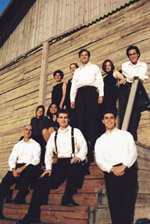 The
Russians are coming?
The
Russians are coming?
No
one is likely to forget where they were on 9/11. Members of
Golosá, the Russian Choir of the University of Chicago,
were in Tarbagatay on Lake Baikal, near Siberia's Mongolian
border, where they had just finished a concert. Golosá
had already performed in Moscow and in Irkustsk and then made
the long train trip to Tarbagatay to sing with Sud'binuska,
an award-winning folk choir that inspires much of their repertoire.
|
|
Going native? For Siberia, Golosá
discarded its ersatz folk dress.
|
Russian
for "voices" and "melodies," Golosá
was formed in summer 1997 by Loren Shevitz and Noel Taylor,
AM'99. Taylor wanted a way to keep singing the folk songs he
had learned during a semester with the Russian Choir of Freiburg.
Today the choir is a baker's dozen of Chicago undergrad and
graduate students, alumni, and friends-only four of whom speak
Russian.
Although
Golosá sings a range of Russian folk songs-including
well-known national "anthems" about betrayed Cossacks,
the mother Volga, and the steppes-since 1999 the group has placed
a special emphasis on the distinctive songs of the Semeiskie,
or Old Believers. These religious protesters were first banished
from Russia when they refused to go along with a mid-17th-century
move toward the Greek Orthodox Church. A century later Catherine
the Great invited them back from Polish exile, on the condition
that they move to Siberia and farm for the Cossacks stationed
there to guard against Mongolian invaders.
Isolated
by geography as well as religion, the Old Believers developed
their own tradition, with a more forward, nasal tone than Western
style, repeated chants, and a preponderance of half- and whole-tone
dissonances. Since the songs were never written down, when villagers
joined together to sing, each sang according to his or her own
lights, slightly off-kilter.
Singing
from scores that replicate that sound, Golosá performed
this year at the U of C Folk Festival, twice in Bond Chapel,
and at several venues around the city. The group also produced
its first CD, Golosá: Songs from the Selengá,
the river that flows into Lake Baikal. Monies from the CD and
performances are earmarked to bring the choir's Siberian hosts,
Sud' binuska, to Chicago. (To order the CD go to the choir's
Web site at www.golosa.org.)
Golosá would like to repay that group's hospitality,
which included a welcoming hilltop picnic at dawn featuring
meat pastries, vodka, and singing. More important, says Taylor,
Golosá wants "to share with the rest of the University
community the music that has so inspired us."
-M.R.Y.

![]()
 The
Russians are coming?
The
Russians are coming?